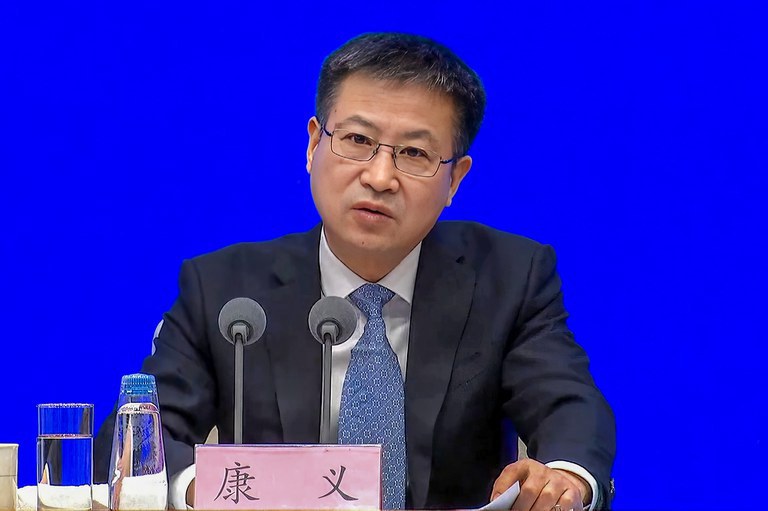China’s population fell by 2 million people last year, fueled by long-term decline in birth rates and a wave of deaths from COVID-19, as the country reported slower-than-expected economic growth in the fourth quarter despite government claims of a post-lockdown recovery.
Economic expansion of 5.2% from October through December achieved the government’s target, but prospects for short-term growth remain hampered by a burst real estate bubble, weak consumer and business confidence and mounting local government debt.
And the slump is proving a major obstacle in the government’s attempts to get people to have more children to boost consumption and curb the aging and shrinking of the population.
The total number of people in China fell by 2.08 million, or 0.15%, to 1.409 billion in 2023, the National Bureau of Statistics reported on Wednesday, compared with a fall of 850,000 in the previous year.
Total deaths last year rose by 6.6% to 11.1 million, with the death rate reaching the highest level since 1974, at the height of the political violence of the Cultural Revolution.
Experts have estimated that the initial wave of Omicron that followed the lifting of three years of lockdowns, compulsory testing and mass quarantines under President Xi Jinping’s zero-COVID policy likely infected up to 1.2 billion people in China.
As the first wave hit an under-vaccinated population, funeral homes and crematoriums were working around the clock to deal with a massive wave of deaths, leading experts to estimate that as many as 1 million people died.

Meanwhile, new births fell 5.7% to 9.02 million and the birth rate was a record low 6.39 births per 1,000 people, down from a rate of 6.77 births in 2022.
The working-age population of people aged 16 to 59 fell by more than 10 million, or just over 60% of the population, weakening attempts to spur recovery through domestic consumption alone.
Youth unemployment
Unemployment among 16-24 year-olds stood at 14.9%, according to the National Bureau of Statistics’ revised calculation method, compared with more than 20% under the previous calculation method.
Both the population figures and youth unemployment rates are highly sensitive topics for the ruling Communist Party, which is keen to sing the praises of the economy in a bid to boost people’s confidence in the future.
An article leaking Wednesday’s official figures was deleted from China’s tightly controlled internet late last month.
Yet even officials admitted that things were not all they could be.
“The employment situation this year is still under pressure, while structural contradictions in the employment of some groups and some industries are prominent,” National Bureau of Statistics chairman Kang Yi told a news briefing in Beijing on Wednesday.

“However, as the economy picks up and improves, as industrial transformation and upgrades accelerate, positive factors for stabilizing employment are also constantly on the increase,” he said.
Economist Si Ling said most people aren’t buying the government’s upbeat claims, however.
“There are issues with almost all of China’s macroeconomic performance and numerical statistics, the job market is bleak, and economic performance is really shocking,” he said.
“Unemployment is highest among the age group that used to find it easiest to get jobs, people under 20,” he said. “A serious lack of growth momentum coupled with unsatisfactory macroeconomic performance make it very hard to create new opportunities and to attract young people to join in [become economically active].”
Facing crises?
Chu Yue-chung, assistant professor of finance at the Southern Taiwan University of Science and Technology, said few people will be taken in by the “recalculation” of the youth unemployment figures.
“Logically speaking, under normal circumstances, the employment rate should be better among young people,” Chu said. “Businesses naturally want to hire young people because … older people want higher salaries.”
“But this is not the reality, and there is a big problem with that.”

U.S.-based economist Cheng Xiaonong, said China is facing an economic and financial crisis, yet the government is hoping to reassure foreign investors and stabilize business confidence, citing a Jan. 16 speech by ruling Chinese Communist Party leader Xi Jinping in which he promised a “tough” approach to the financial sector.
“Xi pointed out that efforts must be made to prevent and defuse financial risks, especially systemic risks,” state news agency Xinhua paraphrased him as saying. “Financial regulation must be ‘sharp and tough’.”
“Local governments should not just do their financial work well, but also focus on the big picture, and manage well [the] financial risks under their jurisdiction and perform their duties well in maintaining stability,” it quoted Xi as saying.
“Corruption must be resolutely cracked down on … and anyone in charge must be held accountable for risk control. We should also crack down on financial crimes,” he said.
According to Cheng, Xi only had one message to put across in that speech.
“That is, that the financial crisis is already here, and it can’t be resolved by conventional means,” he said. “It’s aimed mostly at domestic Chinese banks [because] he thinks bank officials and employees aren’t doing their best.”
“He is saying he will blame them for bad debts incurred during his time in office, that they have to solve this, and if they can’t, they’ll be arrested,” Cheng said.
Translated by Luisetta Mudie. Edited by Malcolm Foster.



